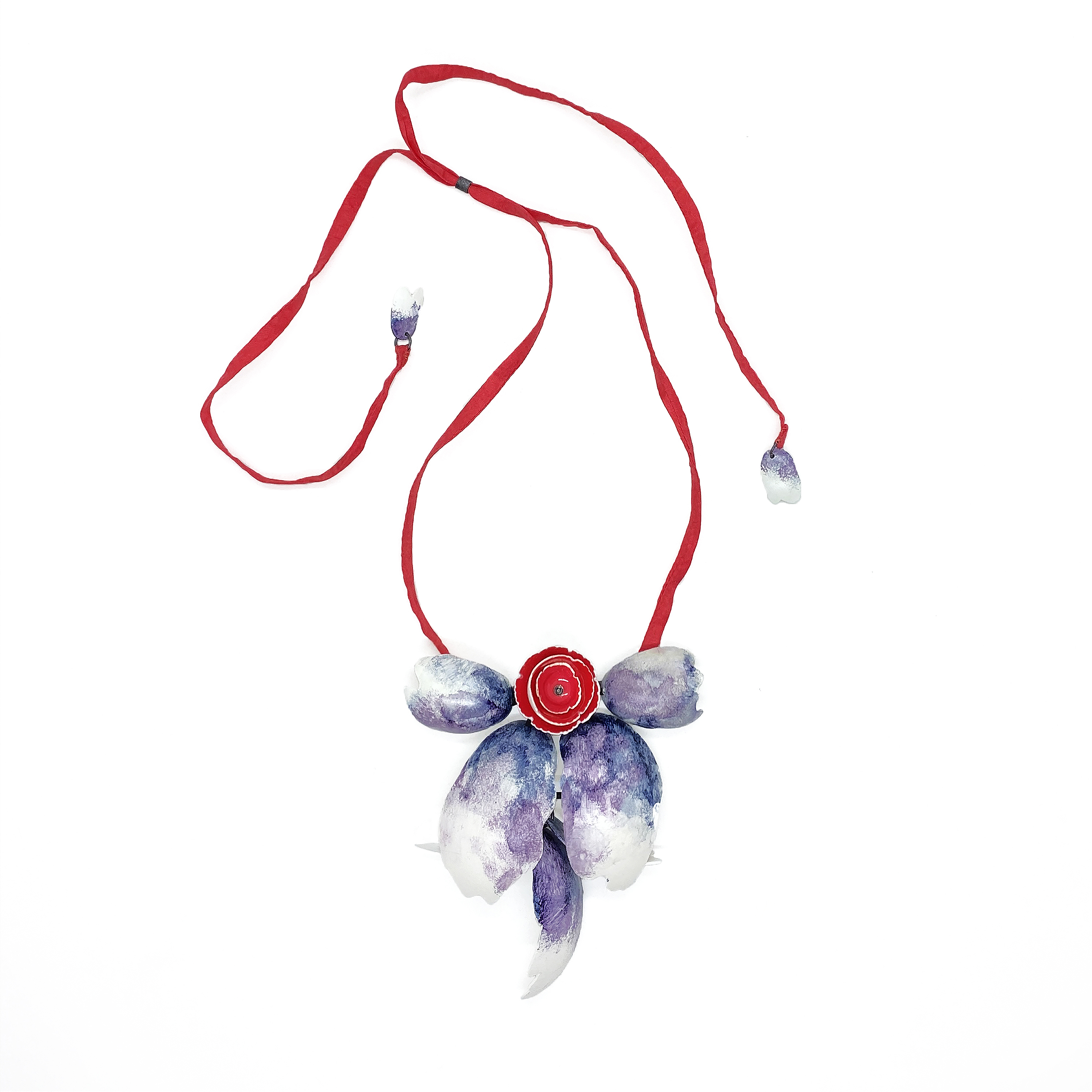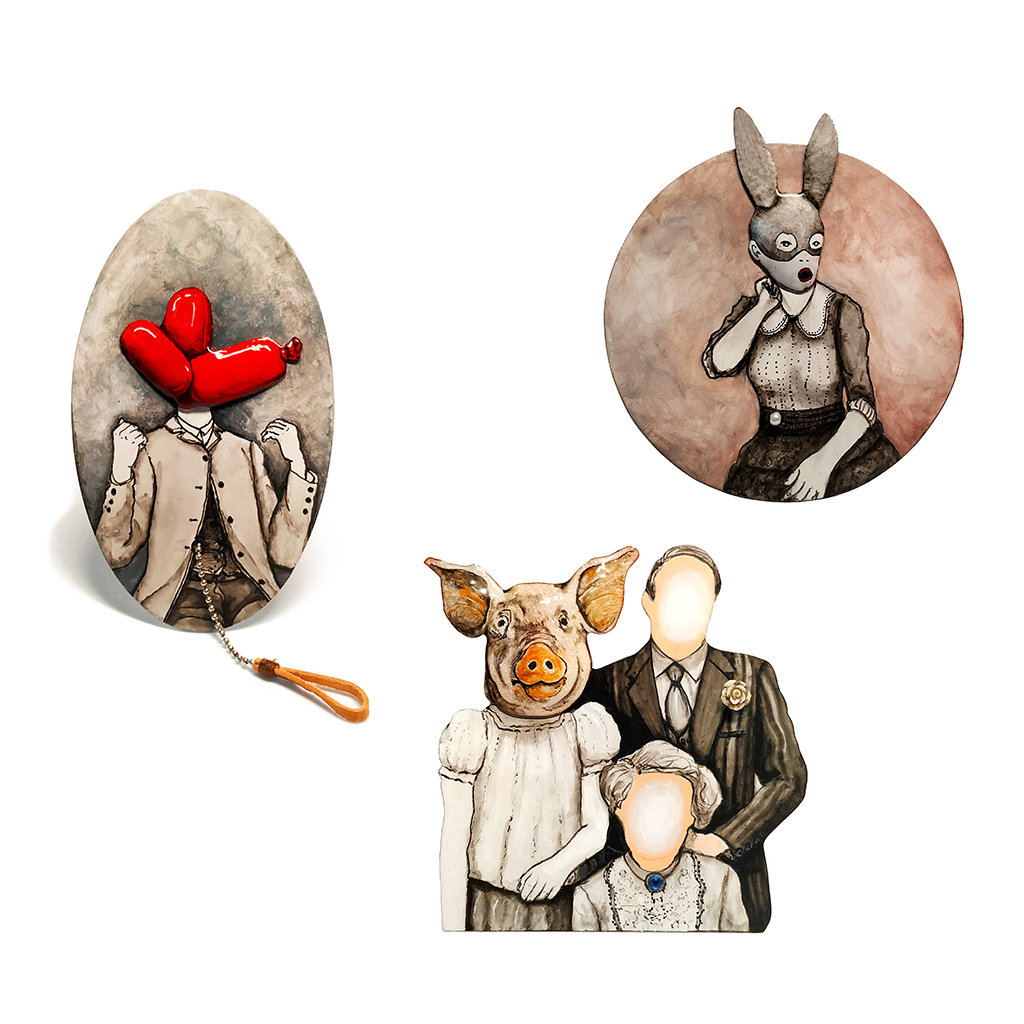Tincal lab Challenge
Venue: Copper Museum, 3 Partyzantów St.
Open: 5.04.-1.06.2025
Opening: 10.05.2025, 18:30
Opening hours:
In the winter season (from 1 October to 31 May)
Tuesday to Friday from 10:00-17:00 on Saturdays from 11:00-17:00
In the summer season (from 1 June to 30 September)
Wednesday to Friday from 10:00-17:00, Saturday and Sunday from 11:00-17:00
Admission free
Jewelry and Freedom
Tincal lab Challenge is an annual initiative that starts with an Open Call to jewellers from all over the world and results in a collective exhibition that aims
to inspire artists and increase public awareness to contemporary jewellery.
It is organised by the Tincal lab gallery from Porto (Portugal), headed by artist Ana Pina. Each edition bears a separate theme.
In 2024, it was “Jewelry and freedom”. It gathered around 200 exclusive jewelry pieces created by the 78 jewelers from 31 different countries selected by the jury from more than 250 applications.
Ana Pina
Ana Pina was born in 1980, in Porto (Portugal). She graduated in architecture (FAUP, 2004) and worked in an office for a few years, until she found her passion for jewellery design. She developed her personal brand since 2012, and founded Tincal lab studio in the summer 2015. In her work she combines her background in architecture with traditional jewellery techniques and contemporary concepts of design in the creation of jewels with a strong abstract and geometric inspiration, in search of a modern, versatile and feminine style.
Artists:
Carolina Apolonia – The Netherlands
Eugènia Arnavat – Spain
Isabelle Azaïs – France/Belgium
Lija Álvarez – Spain
Galit Barak – Israel
Susana Barbosa – Portugal
Lena Birgitsdotter – Sweden
Marcin Bogusław – Poland
Sandra Bostock – Mexico
Raffaella Brunzin – Italy
Yuri Bylkov – Russia/Argentina
Anne Luz Castellanos – Mexico / Argentina
Norman Cherry – Scotland/England
Yu Tzu Chou – Taiwan
Cleopatra Cosulet – Romania
CICLO/Paula Petiz – Portugal
Young-ji Chi – Republic of Korea
Dora Des – Hungary/Austria
Letícia Domingues – Portugal/Germany
Lena Echelle – USA/Argentina
Evgenia Elanic – Russia/Georgia
Esteban Erosky – Mexico/Spain
Micol Ferrara – Italy/Spain
Sławomir Fijałkowski – Poland
Elin Flognman – Sweden
Ani Flys – USA/Spain
Sabrina Formica – Italy
Samantha Fung – Venezuela/Spain
FRUTO/Constanza Nolé – Argentina
Be García – Spain
Juan Harnie – Belgium
Brigitta B. Horváth – Hungary
Poly Iglesias – Argentina
Lorena Jarpa – Chile
Meta Joanknecht – The Netherlands
Katie Kameen – USA
Annelieke Landré – The Netherlands
Lois Lo – China/United Kingdom
Heidi Lowe – USA
Sophie Lowe – United Kingdom
Carmen López – Spain
Lunante/Paolo Gambarelli – Italy
Aušra Mačiulaitienė – Lithuania
Stephie Morawetz – Austria
Susanne Matsché – Austria/Germany
Mo (Mengjie Mo) – China/USA
Clodagh Molloy – Ireland
Fanni Nagy – Hungary
Iona Nieva – Argentina
Taibe Palacios – Chile
Isabella Perillo – Brazil
Lidia Puica – Romania
Catalina Rivera – Peru/Spain
Yaiza Rodríguez – Spain
Silvina Romero – Argentina
Andrea Serini – Argentina
Francine Schloeth – Switzerland
Jane Sedgwick – United Kingdom
Birgit Thalau – Luxembourg
Anna Timár – Hungary
Ho Oi Ying Valerie – Hong Kong
Juergen Veit – Germany
- P. Vellaco – Brazil
Rita Soto Ventura – Chile
Salvador Vico – Spain
Rachel Ruiyi Wang – China/United Kingdom
WEK/Telma Oliveira – Portugal
Ruiya Xu – China/United Kingdom
This is a special year for Portugal. On April 25th of 2024, we celebrated the 50th anniversary of the end of a dictatorship that had lasted for more than 4 decades. Imagine waking up one day and the world has changed. But freedom is a volatile and fragile concept, 50 years later we cannot take it for granted.
The red carnation is the symbol of our April Revolution, for us a symbol of freedom. But what does it mean to be free? What does freedom mean to you? How would you represent it?
The concept of freedom is diverse and complex. Political freedom (or the lack of it) can be associated with physical imprisonment, war, the tyranny of power. But we can also talk about freedom of expression, free will, freedom that promotes equality – after all, where does ours begin and the other’s end?
After fundamental rights are guaranteed, the concept of freedom takes on more personal contours – freedom to act, think, decide, love... basically, to live our lives according to our own criteria, our beliefs. More than ever we discuss about equality of gender and gender identity, the freedom to choose, to be ourselves, without suffering any type of discrimination for it. The future or a utopia?
For some, freedom can be the absence of ties and possessions. Will we really be free if we are financially dependent on a job formatted by society, emotionally linked to someone or simply caught up by our own expectations? On the other hand, can we fully enjoy our freedom, absolutely alone and isolated from
the world?
For an individual to be free, they need to be independent and autonomous, but also informed. Nowadays, freedom of access to information is illusory and often a form of control. How can we distinguish the real from the manipulated?
The works presented at the exhibition refer to the above reflections, presenting a panorama of definitions of freedom.

Ani Flys – USA / Spain
Freedom Wings necklace, egg shells, resin, silver, silk ribbon, rubber, 2024

Esteban Erosky – Mexico / Spain
I Am A Faithful Dog, I Am What I Want To Be, My Family Will Always Love Me brooches, enamel on copper, painted aluminum, 2024
Legnica Jewellery Festival SILVER
The website of the Legnica Jewellery Festival SILVER is co-financed by the Ministry of Culture and National Heritage from the Culture Promotion Fund.

